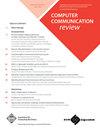Measuring DNS over TCP in the era of increasing DNS response sizes
IF 2.8
4区 计算机科学
Q3 COMPUTER SCIENCE, INFORMATION SYSTEMS
引用次数: 7
Abstract
The Domain Name System (DNS) is one of the most crucial parts of the Internet. Although the original standard defined the usage of DNS over UDP (DoUDP) as well as DNS over TCP (DoTCP), UDP has become the predominant protocol used in the DNS. With the introduction of new Resource Records (RRs), the sizes of DNS responses have increased considerably. Since this can lead to truncation or IP fragmentation, the fallback to DoTCP as required by the standard ensures successful DNS responses by overcoming the size limitations of DoUDP. However, the effects of the usage of DoTCP by stub resolvers are not extensively studied to this date. We close this gap by presenting a view at DoTCP from the Edge, issuing 12.1M DNS requests from 2,500 probes toward Public as well as Probe DNS recursive resolvers. In our measurement study, we observe that DoTCP is generally slower than DoUDP, where the relative increase in Response Time is less than 37% for most resolvers. While optimizations to DoTCP can be leveraged to further reduce the response times, we show that support on Public resolvers is still missing, hence leaving room for optimizations in the future. Moreover, we also find that Public resolvers generally have comparable reliability for DoTCP and DoUDP. However, Probe resolvers show a significantly different behavior: DoTCP queries targeting Probe resolvers fail in 3 out of 4 cases, and, therefore, do not comply with the standard. This problem will only aggravate in the future: As DNS response sizes will continue to grow, the need for DoTCP will solidify.在DNS响应量不断增加的时代,通过TCP测量DNS
域名系统(DNS)是互联网最重要的组成部分之一。虽然最初的标准定义了DNS over UDP (DoUDP)和DNS over TCP (DoTCP)的使用,但UDP已经成为DNS中使用的主要协议。随着新的资源记录(rr)的引入,DNS响应的大小大大增加。由于这可能导致截断或IP碎片,因此标准要求退回到DoTCP,通过克服DoUDP的大小限制来确保成功的DNS响应。然而,到目前为止,存根解析器使用DoTCP的影响还没有得到广泛的研究。我们通过在DoTCP边缘展示一个视图来缩小这个差距,从2,500个探针向公共和探针DNS递归解析器发出121m个DNS请求。在我们的测量研究中,我们观察到DoTCP通常比DoUDP慢,在DoUDP中,对于大多数解析器,响应时间的相对增加小于37%。虽然可以利用对DoTCP的优化来进一步减少响应时间,但我们表明对公共解析器的支持仍然缺失,因此为未来的优化留下了空间。此外,我们还发现公共解析器对于DoTCP和DoUDP通常具有相当的可靠性。然而,探测解析器表现出明显不同的行为:针对探测解析器的DoTCP查询在4种情况中有3种失败,因此不符合标准。这个问题在未来只会加剧:随着DNS响应大小的持续增长,对DoTCP的需求将会固化。
本文章由计算机程序翻译,如有差异,请以英文原文为准。
求助全文
约1分钟内获得全文
求助全文
来源期刊

ACM Sigcomm Computer Communication Review
工程技术-计算机:信息系统
CiteScore
6.90
自引率
3.60%
发文量
20
审稿时长
4-8 weeks
期刊介绍:
Computer Communication Review (CCR) is an online publication of the ACM Special Interest Group on Data Communication (SIGCOMM) and publishes articles on topics within the SIG''s field of interest. Technical papers accepted to CCR typically report on practical advances or the practical applications of theoretical advances. CCR serves as a forum for interesting and novel ideas at an early stage in their development. The focus is on timely dissemination of new ideas that may help trigger additional investigations. While the innovation and timeliness are the major criteria for its acceptance, technical robustness and readability will also be considered in the review process. We particularly encourage papers with early evaluation or feasibility studies.
 求助内容:
求助内容: 应助结果提醒方式:
应助结果提醒方式:


